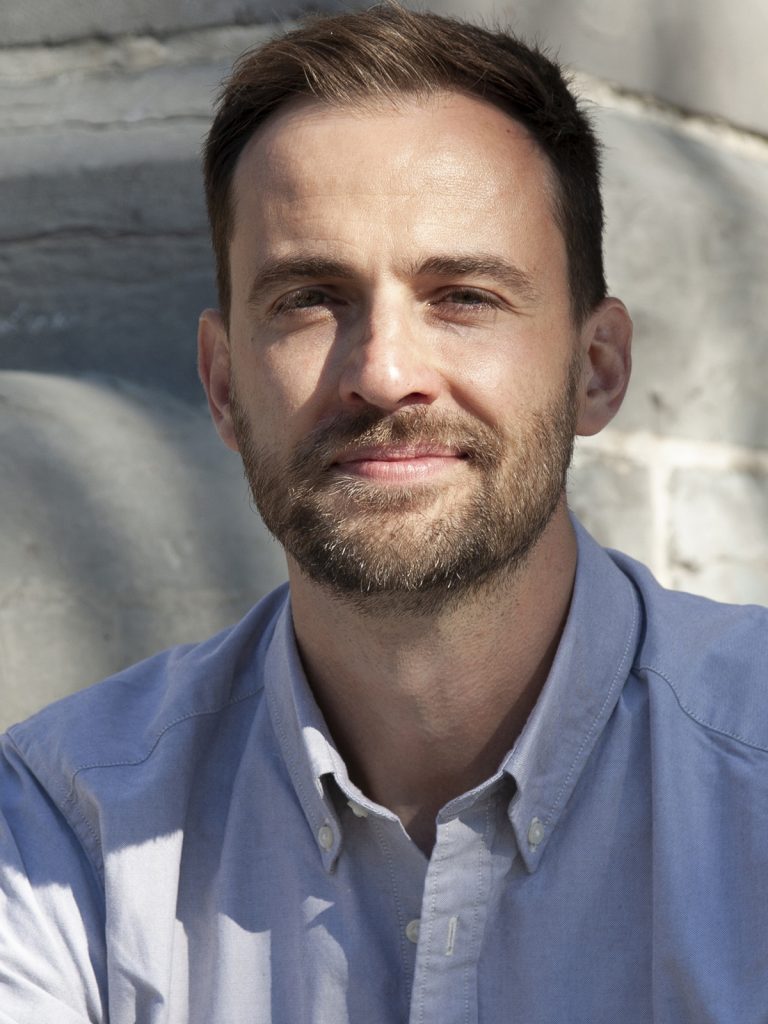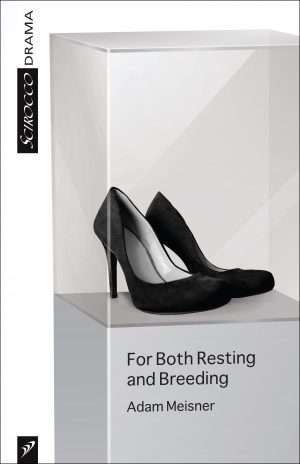Posted November 6, 2023
The Interview – Adam Meisner
Adam Meisner
Adam Meisner was born in Moncton, New Brunswick and now lives in Ottawa on the unceded, unsurrendered Territory of the Anishinaabe Algonquin Nation. Adam’s play For Both Resting and Breeding premiered at Talk is Free Theatre in Barrie, Ontario in 2018, and the company toured the play to the Adelaide Festival in Australia in 2020. Adam’s writing has appeared in literary journals throughout North America, including The Puritan, Poetry is Dead, Iron Horse Literary Review, Copper Nickel, and Ninth Letter. Adam studied theatre at the University of Toronto and the University of Manchester and holds an MFA in Creative Writing from the University of British Columbia.
Adam, your play For Both Resting and Breeding is set in a futuristic society where there is no longer any gender. How did you come up with this original concept?
For several years I tried to write a play about gender and sexuality set against the backdrop of my millennial suburban teenage years. I became frustrated by my attempts and decided to try something new: I would write a play that was without gender and sexuality, a play not set in the year 2000. This exercise brought me to the world of For Both Resting and Breeding, and the very subjects and setting the exercise meant to avoid.
I wrote the first scene of the play, and brought it to a playwriting group that I used to coordinate in Ottawa. I thought it would be no more than a standalone scene, but the group members wanted more, so I kept writing.
Having said all that, I think the idea for this play was evolving in my mind for several years as I read, and loved, many plays that explored the themes of gender, sexuality, and the future. I’m thinking, for example, of Caryl Churchill’s Cloud Nine and Top Girls, both revelations to me when I read them in my first year as a drama student at the University of Toronto. I was also inspired by Anne Washburn’s play Mr. Burns: A Post-Electric Play, and George Saunders’ short story collection Tenth of December.
Talk Is Free Theatre, which first produced For Both Resting and Breeding, took the play on tour to Australia, and is currently touring to Chile and Argentina with it. Can you tell me more about the tours of the show and how the play is being received internationally?
Talk is Free initially performed the piece in a conventional theatre in Barrie. Their tours to Australia and South America have been different in that they’re presenting the piece as a site-specific work in houses that audiences are meant to pretend are the millennial-era house where the play takes place. For that reason, the play on tour has been more intimate, with fewer audience members gathered in the close confines of a domestic space.
The company is touring the play to South America as I write this. The text was translated to Spanish, and Talk is Free Theatre is using a technology that allows the performers to deliver the play in English while audience members wear glasses that display the translated text. I tried the glasses at a rehearsal earlier this year—it was very much in keeping with the futuristic aspects of the play.
I was lucky to attend the performances in Australia. Before one performance, a local man who worked front-of-house suggested that Australians were generally conservative and might not easily embrace some of the radical ideas of the play. But I found Australian audiences to be receptive and warm. As in Canada, every audience experiences the play differently: some nights it seemed to be more of a comedy, others more a tragedy.
Notably, the Australian performances took place at the start of March 2020 with murmurings of the COVID pandemic all around. I don’t think any of us noticed it at the time, but looking back I recall a mysterious tension in the air. Perhaps it was a prophetic sense that this would be the last theatre experience for many of us for several months. Though maybe the feeling I’m remembering was my own anxiety about whether the play would be well received or not.
The binary way of thinking about gender has been prevalent in our society for a long time. During rehearsals of the show, was it difficult for actors to portray characters who didn’t identify with any gender?
The actors never mentioned any difficulty in portraying genderless characters when I was in the rehearsal room—though it’s possible I wasn’t around when those conversations took place.
From where I sat, it seemed to be a liberating process for many of the actors. I witnessed a lot of silliness and play happening in rehearsal, the actors using their bodies and voices with greater range than I often see, as a playwright, in the staging of new work. I wondered if this came with the freedom of not having to walk or talk in gender-normative ways, something that’s often required in more conventional plays, especially those with cishet romances at the heart of their narrative. Of course, this is my interpretation—I can’t speak for the experiences of the many actors who’ve performed the play.
Regardless, I think it’s worth noting that the actors who have performed the piece have come from a diversity of backgrounds in terms of gender as well as sexuality, cultural heritage, race, and age. I think this has meant the process of becoming an ish has been vastly different for each actor. This has enriched how I understand my own text. There are many layers to how the play can be interpreted—by artists and audiences. I like this idea of diverse people coming together, adding to and nuancing the text.
You are not only a playwright, you also write fiction and poetry. What can you tell us about the differences between the forms, in your experience?
I love the collaborative nature of writing for the stage. There’s something very exciting to me about actors, directors and designers interpreting my words. Often I’ll imagine something one way, and a creative team will take it in a surprising new direction. Or they’ll create something that was vague to me in my mind as the writer. While I was writing For Both Resting and Breeding, for example, I couldn’t imagine what the characters’ futuristic clothing looked like—I was happy to have costume designers take over on this front. With fiction, the interpretation is, of course, happening in the mind of the reader—and poetry can be similar. It’s a more intimate, direct experience between writer and reader. And yet, the work exists apart in our two minds.
With all three, however, hearing my words spoken aloud gives me a lot of insight into what is and what is not working with my writing. I often fail to see the strengths and weaknesses of a piece I’m working on until I hear it aloud.
Not only do you have an MFA in Creative Writing, you also have an MA in Canadian Studies in the area of Culture and Cultural Policy. Do you think that the latter degree influences your writing?
My MA in Canadian Studies gave me a strong understanding of arts and culture practice in Canada: its history and evolution, as well as the institutions that contribute to it—their strengths and shortcomings. The MA also allowed me to explore a breadth of arts practices in Canada, beyond one field of practice like theatre. I was able to study cinema, literature, dance, and the visual arts in Canada, and I received a dynamic introduction to Indigenous arts practice. All this has given me a stronger understanding of where my work fits in—what I’m in dialogue with and what I hope to contribute anew.
I’d also add that my MA in Canadian Studies encouraged me to think deeply about the formation of national identities—in Canada and in general. Identity formation often pops up in my writing I believe a result of my studies. I certainly think conversations around community-identity formation are present throughout For Both Resting and Breeding.
Adam, you’re known to be a big reader. Who are some of your favourite authors?
I’m in the process of moving right now, so all my books are hidden in boxes and I can’t consult my shelves. Off the top of my head, there are several authors I frequently return to—for both comfort and inspiration. In terms of playwrights, these include Annie Baker, Anton Chekhov, Caryl Churchill, and Tony Kushner. I’m fond of the short stories of Mavis Gallant, Alice Munro, and Tessa Hadley (whose novels I also thoroughly enjoy). For novelists, a few favourites include Robertson Davies, Barbara Pym, Colm Tóibín and Denton Welch. I’m a fan of the poets John Ashbery and Carl Phillips.
What’s the best writing advice that you’ve ever received?
I’ve benefited from a lot of great writing advice over the years. One of the best came to me from Maja Ardal, who directed and performed in For Both Resting and Breeding. While I struggled to rewrite the ending of the play, Maja told me to listen to the characters: they would tell me where the play needed to go. Once I focussed on the characters’ various desires and how they conflicted with one another, I readily found my way.


